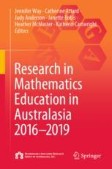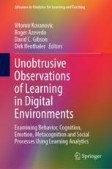Search
Search Results
-
Characterizing the Ways in Which Young Students Recognise, Describe, Explain, and Employ Variation When Analysing Data in a STEM Context
This report focuses on the ways in which 36 Grade 4 students recognized, explained, described, and employed variation during interviews conducted...

-
From Exclusion to Inclusion for Marginalised Learners—Theoretical Perspectives
Throughout our careers, we have been guided by critical pedagogy and socio-cultural perspectives on learning. It is our firm view that learners are...
-
Using Reverse Engineering to Enhance Ninth-Grade Students’ Understanding of Thermal Expansion
Given that many models of design-based learning in science education are grounded in forward engineering, in which students are challenged to use the...

-
Learning Number Conversions Through Embodied Interactions
In this paper, the researchers report an experimental study on conceptual knowledge learning and application through embodied interactions, expecting...

-
Preparing Secondary Science Teachers to Teach Linguistically Diverse Students
Preparing all students to develop their science capabilities and succeed in twenty-first-century information-based technological contexts is of...
-
Pedagogical Encounters: Teaching and Learning in Melbourne Classrooms
This chapter reflects on children’s pedagogical encounters in primary school classrooms in Melbourne, as a key aspect of their lifeworlds at school....
-
Conclusion
The controversy on whether students in Hong Kong secondary schools should use their Chinese mother-tongue or English as the medium of instruction...
-
Canada (Ontario): A Unifying Theme for Canadian Education Is Equity
Canada has one of the most successful education systems in the world, as evidenced by continuous high performance on various international...
-
Introduction
The place where a child lives and attends school matters, and matters a great deal. Few would dispute this fact, yet the intricacies contained within...
-
Linguistic Literacy: Twenty Years Later
The chapter provides an updated reappraisal of Ravid & Tolchinsky’s (2002) framework modeling linguistic literacy. The chapter suggests a...
-
Language Education for Everyone? Busting Access Myths
Finland has, rather successfully, promoted an image of itself as a model of educational excellence and linguistic equity. This chapter problematises...
-
Facets of Numeracy: Teaching, Learning and Practices
The purpose of this chapter is to develop an inclusive and coherent discussion about research developments within numeracyNumeracy while, at the same...
-
Electrodermal Activity Wearables and Wearable Cameras as Unobtrusive Observation Devices in Makerspaces
Makerspaces are a unique type of environment for unobtrusive observation of learning in digital environments given that they encourage free movement...
-
The Pedagogical Perspective of Learning Analytics
The Pedagogical mechanisms can be seen in the education system focused on curriculum delivery & use the students’ characteristics and learning...
-
Transformation of the mathematics classroom with the internet
Growing use of the internet in educational contexts has been prominent in recent years. In this survey paper, we describe how the internet is...
-
Systemic Cognition
Learning is most meaningful and productive when it conforms in experiential ways to how our minds and brains are and how they efficiently work during...
-
Media as Catalysts
Seen from ideological innovators, the integration of new media in education is a pernicious affair; first of all, as it seduces learners to escape...
-
Materialist epistemology lends design wings: educational design as an embodied process
Materialist design is presented as an embodied perspective on educational design that can be applied to redesign of classroom-based learning...

-
Does a Knowledge Generation Approach to Learning Benefit Students? A Systematic Review of Research on the Science Writing Heuristic Approach
The shifting emphases of new national curricula have placed more attention on knowledge generation approaches to learning. Such approaches are...

-
Engaging Gifted Students in Solving Real Problems Creatively: Implementing the Real Engagement in Active Problem-Solving (REAPS) Teaching/Learning Model in Australasian and Pacific Rim Contexts
We believe that engaging students in solving problems they perceive as real and relevant in their lives, combined with differentiation, is an...
